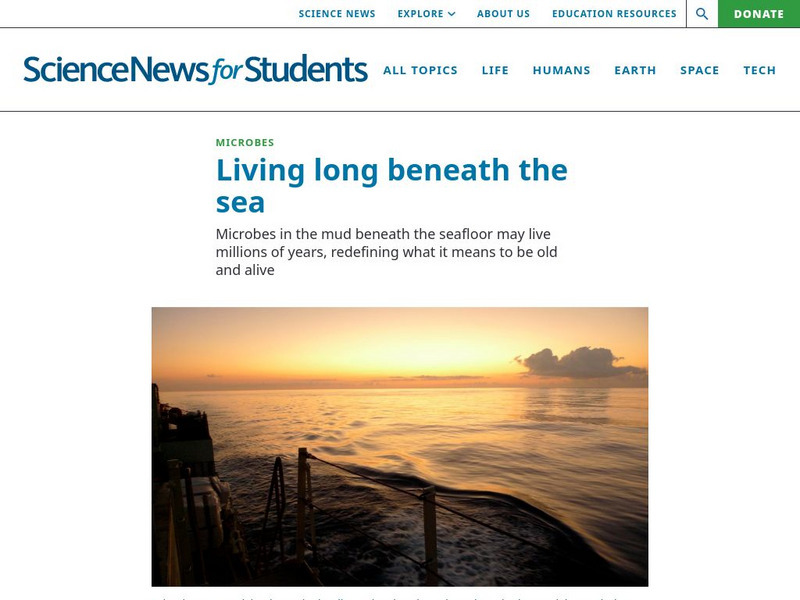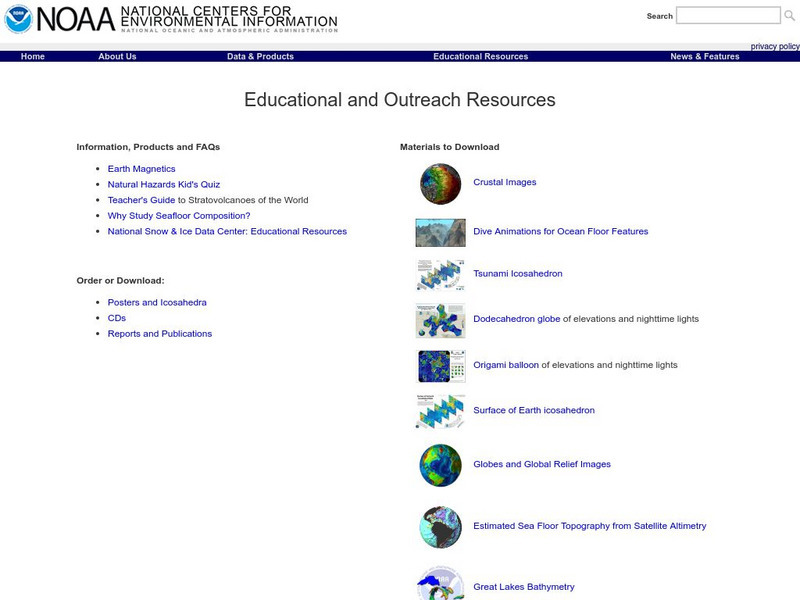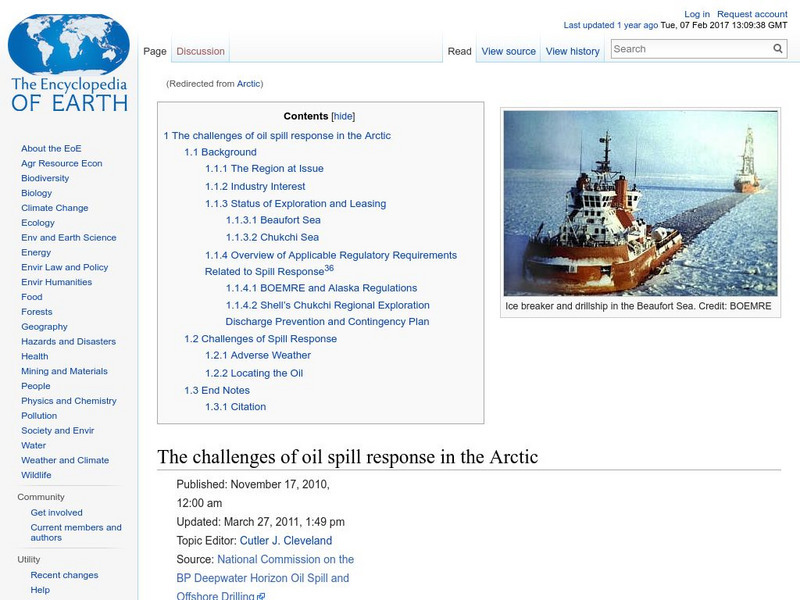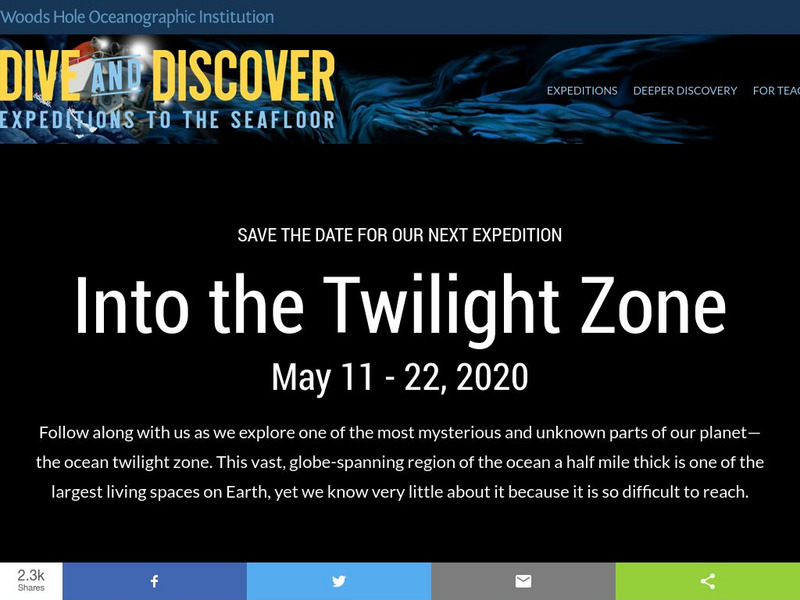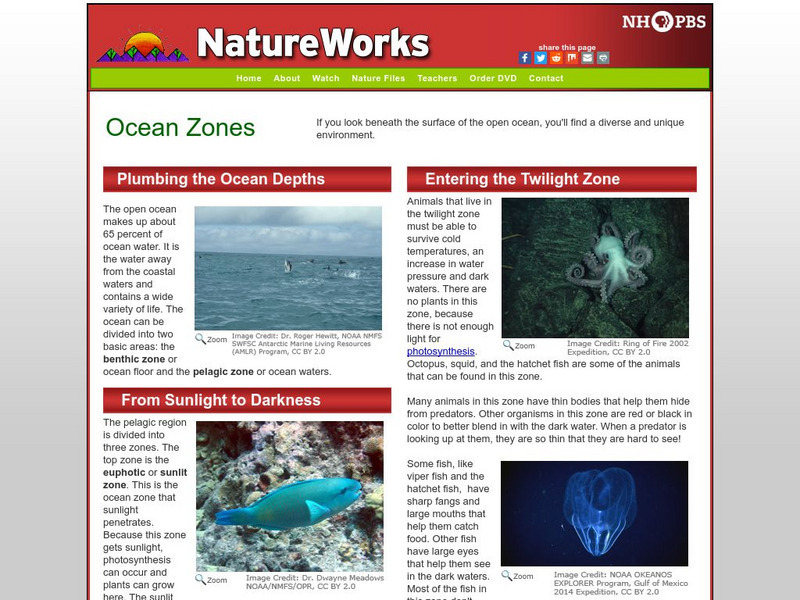Hi, what do you want to do?
Boise State University
Boise State University: Ocean Exploration: Abyssopelagic (Abyssal) Zone
Learn about the very cold, dark region of the ocean known as the abyss. Includes information on the origin of the name of this ocean zone, as well as information on its depth and animal life.
University of California
Ucmp: Plate Tectonics: The Mechanism
A basic description of the driving force behind plate movement. Describes major features of the ocean floor including mid-oceanic ridges.
US Navy
Naval Historical Center: The Navy Travels Undersea
[Archived Content] Have you ever wondered how it is possible to explore the ocean floor? This interactive site developed by the U.S. Navy answers this and other questions through various activities. Includes a biography of Dr. Ballard.
Society for Science and the Public
Science News for Students: Beneath the Sea
What does it mean to be alive? Scientists are now revisiting this question as they discover previously unknown microorganisms at the bottom of the ocean.
Other
University of California: Ocean Drilling Program
Scientists probe the ocean floor off Costa Rica and find evidence that may tell us more about what goes on in ocean trenches.
TED Talks
Ted: Ted Ed: How Much of Human History Is on the Bottom of the Ocean?
Sunken relics, ghostly shipwrecks, and lost cities aren't just wonders found in fictional adventures. Beneath the ocean's surface, there are ruins where people once roamed and shipwrecks loaded with artifacts from another time. Peter...
Vision Learning
Visionlearning: Plate Tectonics: The Origin of Plate Tectonic Theory
Discover Alfred Wegner's ideas relating to continental drift and seafloor spreading which are both evidence to the concept of plate tectonics.
University of California
Mid Ocean Ridge
An article from Scientific American details some recent discoveries about the ridge systems. "New maps reveal striking details of how segments of the Ridge form and evolve."
Texas A&M University
Texas A&m University: Properties of the Ocean Activities
This site is from the Texas A&M University provides a lesson plan on measurement and properties of the ocean. As part of the lesson plan students are challenged to create a model of an underwater amusement park. Web resources are...
American Geosciences Institute
American Geosciences Institute: Oceans
Seven hands-on lessons module in which students explore oceans. Inquiry-based investigations include properties of seawater, ocean water and currents, and features of the ocean floor.
NOAA
Noaa: Ngdc: Images, Visualizing Data
The National Geophysical Data Center has transformed extensive ocean research into colorful video, 3D maps, charts posters and more! This site starts off with a film clip of a dive into the Marianas trench and then lead you to other...
American Geosciences Institute
American Geosciences Institute: Earth Science Week: A Bit of Engineering
After researching how scientists drill into the ocean floor to retrieve core samples, students work in small groups to simulate the process in the classroom and report on their findings.
Georgia Department of Education
Ga Virtual Learning: Geological Oceanography
This unit will focus on the geological characteristics of the world ocean, plate tectonics, and the mapping of the ocean floor.
NOAA
Noaa: Ne Mo: Hydrothermal Vents
Clearly describes hot springs on the ocean floor called hydrothermal vents. Details characteristics of the vents and how they work.
Other
Geocraft: When Ocean Floor and Continents Collide
Educational site provides users with some understanding of how a volcano forms through the process of subduction.
Encyclopedia of Earth
Encyclopedia of Earth: Arctic Ocean
Lengthy illustrated article about the Arctic Ocean discusses all the many features and characteristics of this vast northern ocean--sea ice, icebergs, ice shelves, ice islands, the Arctic Ocean floor, continental shelf--as well as the...
Encyclopedia of Earth
Encyclopedia of Earth: Atlantic Ocean
Information on the features, size, salinity, temperature, ocean floor, currents, and tides of the Atlantic Ocean.
PBS
Idaho Public Television: Ocean Murals
Integrative lesson plan incorporates math, science and art to teach children about the ocean and its inhabitants. Multiple activities included, approximately 4-6 days to complete. to other sources on oceans. References Bill Nye video...
Science Education Resource Center at Carleton College
Serc: Fathoms, Ship Logs, and the Atlantic Ocean
Middle schoolers use data from ship logs to graph a profile of the Atlantic Ocean. They will rely on prior knowledge of seafloor topography, instructions on how to read a bathymetric map, and observe a demonstration where the depth of...
Science Struck
Science Struck: Interesting Facts About the Abyssal Zone
The Abyssal Zone lies deep in the ocean in the pelagic layer between 4,000 to 6,000 m or 13,000 to 19,500 ft. Learn about some of the unique life forms that call this zone their home, how they have adapted to the extreme pressure and...
NASA
Nasa: Dynamic Ocean Topography With Current Arrows
Color-coded image of ocean currents depicts directional flow and speed of the currents across the globe.
Other
The National Academies of Sciences, Engineering, and Medicine: Project Mohole
Project Mohole was "the earth sciences' answer to the space program," a project to gain information about the Earth by drilling a hole through the Earth's crust to the Mohorovicic Discontinuity (Moho). This website gives a history of the...
Woods Hole Oceanographic Institution
Woods Hole Oceanographic Institute: Dive and Discover: Expeditions to Sea Floor
Join Woods Hole scientists as they search for new volcanic eruptions on the ridge system in the eastern Pacific.
PBS
Nh Pbs: Nature Works: Ocean Zones
Discover more about the underocean environment at this site that surveys animals, environmental factors such as light and temperature, currents, animals, plants, and the like.







